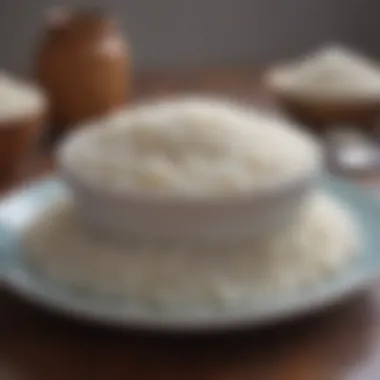Optimal Food Choices for Diarrhea Relief: A Comprehensive Guide


Wellness
When you find yourself grappling with the discomfort of diarrhea, focusing on your physical health becomes paramount in aiding your recovery journey. The types of foods you consume play a crucial role in alleviating symptoms and restoring balance to your digestive system. It is essential to be mindful of what you eat, as certain foods can either exacerbate or alleviate diarrhea symptoms. Making informed choices about your nutrition and diet can significantly impact your well-being during episodes of diarrhea.
Nutrition and Diet
The foundation of combating diarrhea lies in making appropriate food choices that are gentle on your digestive system. Opt for bland, easily digestible options such as bananas, rice, applesauce, and toast (BRAT diet). These foods help to bind stool and regulate bowel movements, providing relief from diarrhea. Additionally, probiotic-rich foods like yogurt can replenish beneficial gut bacteria, promoting intestinal health and aiding in recovery.
Physical Health
The importance of maintaining physical health while experiencing diarrhea cannot be overstated. Dehydration is a common concern during bouts of diarrhea due to increased fluid loss. It is crucial to stay hydrated by consuming clear fluids like water, herbal teas, and electrolyte-rich drinks to replenish lost fluids and electrolytes. Prioritizing hydration supports your overall well-being and aids in the recovery process.
As you navigate the nuances of managing diarrhea through dietary choices and hydration, remember that each decision you make contributes to your physical health and influences your recovery trajectory. Being conscientious about what you eat and drink can significantly impact how your body copes with and overcomes the challenges posed by diarrhea.
Understanding Diarrhea
In this comprehensive article about the best food to eat when experiencing diarrhea, understanding the causes and effects of this condition is paramount. Diarrhea can result from various factors such as viral infections, bacterial infections, and food sensitivities. These triggers can disrupt the normal digestive process, leading to frequent loose or watery stools. Understanding the root causes of diarrhea is crucial for selecting the most suitable dietary choices that aid in recovery and restore gastrointestinal health.
Causes of Diarrhea
Viral Infections:
Viral infections are a common cause of diarrhea, often resulting from exposure to viruses such as norovirus or rotavirus. These infections affect the lining of the intestines, leading to inflammation and increased fluid secretion, causing watery stools. While viral diarrhea is usually self-limiting, it can be highly contagious and may require supportive care to prevent dehydration. Including foods that are gentle on the stomach and easy to digest is vital during this period.
Bacterial Infections:
Bacterial infections, like those caused by Escherichia coli or Salmonella, can trigger diarrhea by producing toxins that irritate the intestines. The symptoms of bacterial diarrhea may include abdominal cramps, fever, and bloody stools. Proper hygiene and food safety practices are essential in preventing bacterial diarrhea. When dealing with bacterial infections, focusing on foods that promote gut healing and have antimicrobial properties can aid in recovery.
Food Sensitivities:
Food sensitivities, such as lactose intolerance or gluten sensitivity, can also lead to diarrhea in susceptible individuals. Consuming foods that trigger an allergic response or intolerance can disrupt gut integrity and result in digestive upset. When managing diarrhea due to food sensitivities, identifying and eliminating trigger foods from the diet is crucial. Opting for easily digestible and hypoallergenic foods can help alleviate symptoms and support optimal gut function.
Effects on the Body
Dehydration:
One of the primary concerns associated with diarrhea is dehydration. The loss of fluids through frequent loose stools can lead to electrolyte imbalances and compromise overall health. Replenishing lost fluids by consuming water, electrolyte-rich beverages, and soups is essential to prevent dehydration and support proper body function during episodes of diarrhea.
Electrolyte Imbalance:
Along with fluid loss, diarrhea can disrupt the balance of electrolytes in the body, such as sodium, potassium, and chloride. Electrolytes play a crucial role in nerve function, muscle contraction, and fluid balance. Maintaining electrolyte balance through the consumption of electrolyte-rich foods or drinks can help prevent muscle cramps, weakness, and other symptoms associated with electrolyte imbalances.
Nutrient Loss:


Diarrhea can also lead to the depletion of essential nutrients needed for overall health. The body may lose vitamins, minerals, and other key nutrients through rapid elimination of stool. Replacing these lost nutrients by incorporating nutrient-dense foods rich in zinc, vitamin C, and potassium can support immune function, aid in tissue repair, and promote recovery after a bout of diarrhea.
Best Foods to Eat
In the realm of gastrointestinal issues, diarrhoea reigns supreme as a common discomfort many find themselves grappling with. The impact of this condition on the body is significant but can be mitigated with the right dietary choices. Understanding the significance of the best foods to eat when experiencing diarrhoea is crucial for promoting recovery and restoring digestive balance. Selecting the appropriate foods can aid in easing symptoms, preventing dehydration, and replenishing vital nutrients during this challenging time.
BRAT Diet
When it comes to alleviating digestive distress, the BRAT diet is often recommended as a go-to solution. Comprising bananas, rice, applesauce, and toast, this diet focuses on bland, low-fiber foods that are gentle on the stomach. Each component plays a vital role in easing symptoms, promoting recovery, and providing essential nutrients the body needs to bounce back from diarrhoea.
Bananas
Bananas are a staple in the BRAT diet for a good reason. They are easily digestible, rich in potassium, and gentle on the stomach. The soft texture of bananas soothes irritated intestines, while the high potassium content helps replenish electrolytes lost during episodes of diarrhoea. Incorporating bananas into your diet can aid in regulating bowel movements and restoring normal digestive function.
Rice
Rice, particularly white rice, is a binding food that helps firm up stool consistency. Its bland nature makes it easy on the digestive system, while its high carbohydrate content provides a much-needed energy boost during periods of gastrointestinal discomfort. By opting for rice as part of the BRAT diet, individuals experiencing diarrhoea can find relief from loose stools and ongoing digestive issues.
Applesauce
Applesauce is another soothing addition to the BRAT diet. Easily digestible and gentle on the stomach, applesauce helps regulate digestion and provides a source of vitamins and minerals that may be lacking during diarrhoea. The natural sweetness of applesauce can also help curb sugar cravings without aggravating gastrointestinal symptoms.
Toast
Toast, particularly when made from white bread, is a bland carbohydrate that can help settle the stomach and provide a source of energy. The mild nature of toast makes it an ideal choice for individuals experiencing diarrhoea, as it is unlikely to exacerbate digestive discomfort. Including toast in the BRAT diet can support overall recovery and help restore normal bowel function.
Clear Liquids
In addition to the BRAT diet, clear liquids play a crucial role in maintaining hydration and providing essential electrolytes during bouts of diarrhoea. Broth, herbal tea, and coconut water are excellent choices for staying hydrated and replenishing fluids lost through diarrhoea-induced dehydration.
Broth
Broth, whether it be chicken or vegetable-based, is a hydrating liquid that contains essential electrolytes such as sodium and potassium. Consuming broth helps prevent dehydration, supports electrolyte balance, and provides a comforting source of nourishment during periods of gastrointestinal distress.
Herbal Tea
Herbal teas like chamomile or ginger tea are not only soothing but also aid in digestion and alleviate stomach discomfort. These teas can help reduce inflammation in the digestive tract, promote relaxation, and provide a gentle source of hydration that is easy on the stomach. Including herbal teas in your diet when experiencing diarrhoea can be beneficial for easing symptoms and promoting overall well-being.
Coconut Water
Coconut water is a natural source of hydration that is rich in electrolytes such as potassium and magnesium. Known for its refreshing taste and rehydrating properties, coconut water is an excellent choice for individuals looking to replenish fluids and minerals lost through diarrhoea. Its natural sweetness and soothing properties make it a popular option for staying hydrated and promoting recovery.
Probiotic-Rich Foods
Introducing probiotic-rich foods into your diet can help restore the balance of beneficial bacteria in the gut, promoting optimal digestive health during and after a bout of diarrhoea. Foods like yogurt, kefir, and kimchi are excellent sources of probiotics that can support gut health and aid in the recovery process.


Yogurt
Yogurt is a well-known probiotic food that contains live cultures beneficial for gut health. These active cultures help improve digestion, boost immune function, and restore balance to the gut microbiome. Consuming yogurt during episodes of diarrhoea can help reduce symptoms, replenish beneficial bacteria, and support overall digestive well-being.
Kefir
Kefir, a fermented dairy drink, is rich in probiotics that promote gut health and enhance digestion. Similar to yogurt, kefir contains a diverse range of beneficial bacteria that can help alleviate gastrointestinal issues, improve nutrient absorption, and strengthen the immune system. Including kefir in your diet can aid in rebuilding a healthy gut microbiome and promoting recovery from diarrhoea.
Kimchi
Kimchi, a traditional Korean dish made from fermented vegetables, is a potent source of probiotics and beneficial enzymes. Its tangy flavor and robust probiotic profile make it a valuable addition to a post-diarrhoea diet. Consuming kimchi can help replenish gut flora, reduce inflammation in the digestive tract, and support overall digestive health. Incorporating kimchi into your meals can assist in restoring gut balance and promoting long-term digestive wellness.
Binding Foods
When dealing with diarrhoea, incorporating binding foods into your diet can help firm up stool consistency and alleviate gastrointestinal discomfort. Foods like oatmeal, boiled potatoes, and psyllium husk are excellent choices for promoting bowel regularity and supporting digestive health during episodes of diarrhoea.
Oatmeal
Oatmeal is a fiber-rich, binding food that can help regulate bowel movements and promote digestive regularity. Its soluble fiber content absorbs water in the intestines, forming a gel-like consistency that aids in solidifying stool. Adding oatmeal to your diet can help bulk up stools, ease diarrhoea symptoms, and support overall gastrointestinal function.
Boiled Potatoes
Boiled potatoes are a gentle and starchy food that can aid in firming up stools and easing digestive discomfort. Their low-fiber content and easy digestibility make them an ideal choice for individuals experiencing diarrhoea. Consuming boiled potatoes can help provide a source of energy, regulate bowel movements, and promote gastrointestinal healing.
Psyllium Husk
Psyllium husk is a natural fiber supplement that acts as a bulk-forming laxative, helping to absorb water in the intestines and promote solid stool formation. Incorporating psyllium husk into your diet can aid in relieving diarrhoea, regulating bowel movements, and improving overall digestive health. This gentle fiber supplement can be beneficial for individuals looking to manage gastrointestinal issues and promote regularity in their digestive system.
Avoid These Foods
When dealing with diarrhea, it is crucial to understand the significance of avoiding certain foods that may exacerbate the condition. By steering clear of specific food items, individuals can aid in easing symptoms and promoting quicker recovery. The role of these foods in exacerbating diarrhea cannot be overstated. As such, careful consideration of dietary choices plays a pivotal part in managing the condition effectively.
Spicy Foods
Spicy foods are known to be a common trigger for digestive upsets, including diarrhea. The components in spicy dishes such as capsaicin can irritate the gastrointestinal system, leading to increased bowel movements and discomfort. It is recommended to avoid spicy foods to prevent further irritation and allow the digestive system to heal. Opting for milder alternatives can help alleviate symptoms and prevent unnecessary distress during bouts of diarrhea.
Greasy Foods
Greasy or fatty foods can be problematic for individuals experiencing diarrhea as they can be hard to digest and may worsen gastrointestinal distress. High-fat food items like fried foods and rich sauces can contribute to increased bowel movements and cramping, prolonging the recovery process. It is advisable to steer clear of greasy foods and opt for lighter, more easily digestible options to support digestive health and symptom relief.
Dairy Products
During episodes of diarrhea, it is recommended to avoid dairy products as they can be challenging for the digestive system to process. Lactose intolerance or sensitivity to dairy can exacerbate existing symptoms of diarrhea, leading to further discomfort and bloating. By excluding dairy products such as milk, cheese, and yogurt from the diet temporarily, individuals can potentially reduce digestive distress and promote faster recovery.
Hydration Tips


When it comes to managing diarrhea effectively, considering hydration tips is paramount in ensuring a swift recovery and maintaining overall health. Diarrhea can lead to significant fluid loss in the body, which highlights the vital role of hydration in this process. Adequate hydration not only helps in replenishing lost fluids but also assists in restoring electrolyte balances, which are crucial for various bodily functions.
Importance of Hydration
Hydration plays a pivotal role in the recovery process when dealing with diarrhea. It helps in preventing dehydration, a common risk associated with diarrhea, which can lead to serious health complications if left unaddressed. By consuming enough fluids, individuals can counteract the effects of excessive fluid loss, thereby promoting quicker recovery and preventing further health issues.
Recommended Fluids
Water
Water stands out as a fundamental choice for maintaining hydration levels during episodes of diarrhea. Its simplicity and accessibility make it an ideal option for replenishing lost fluids quickly. Water not only aids in hydration but also helps in flushing out toxins from the body, supporting the digestive system's function. Its neutral nature makes it gentle on the stomach, easing any discomfort.
Electrolyte Drinks
Electrolyte drinks are valuable during diarrhea, as they contain essential minerals like sodium and potassium that help restore electrolyte balance in the body. These drinks aid in hydrating the body effectively and replenishing critical minerals lost through diarrhea-induced fluid expulsion. Including electrolyte drinks in your hydration regimen can expedite the recovery process.
Herbal Teas
Herbal teas offer a soothing and hydrating option during bouts of diarrhea. Specific herbal teas like chamomile or ginger tea help calm the digestive system and reduce inflammation, promoting overall gut health. The warmth of herbal teas can also provide comfort and relaxation, contributing to a sense of well-being during periods of gastrointestinal distress.
Nutritional Support
Nutritional support plays a crucial role in aiding recovery during bouts of diarrhea. When dealing with digestive issues, ensuring adequate intake of essential vitamins and minerals becomes paramount. Optimal nutrition helps replenish lost nutrients and promotes overall well-being. Individuals suffering from diarrhea often experience nutrient depletion due to increased bowel movements. Therefore, focusing on Nutritional Support through the consumption of specific vitamins and minerals becomes a vital aspect of managing the condition.
Vitamins and Minerals
Zinc
Zinc, a crucial mineral, contributes significantly to the goal of enhancing recovery from diarrhea. Zinc plays a key role in supporting immune function and aiding in healing processes within the body. Its anti-inflammatory properties can assist in soothing the digestive system and reducing gastrointestinal discomfort. Additionally, Zinc is known for its ability to strengthen the gut lining, which is beneficial when experiencing diarrhea. Incorporating Zinc-rich foods into your diet can help alleviate symptoms and promote a speedier recovery.
Vitamin
Vitamin C, known for its immune-boosting properties, is instrumental in supporting overall health, especially during episodes of diarrhea. This vitamin acts as a powerful antioxidant, aiding in the repair of damaged tissues in the digestive tract. Its ability to promote collagen production can enhance gut integrity, potentially reducing the severity of diarrhea symptoms. Including Vitamin C-rich foods in your meals can aid in restoring optimal health and well-being.
Potassium
Potassium is a vital electrolyte that plays a crucial role in maintaining fluid balance within the body. During diarrhea, electrolyte levels can become imbalanced, leading to dehydration and further complications. Potassium-rich foods help replenish lost electrolytes, promoting hydration and restoring proper functioning of various bodily systems. Incorporating Potassium-rich options into your diet can aid in preventing electrolyte disturbances and supporting overall recovery.
Natural Supplements
Ginger
Ginger, a potent natural supplement, offers multiple benefits in alleviating symptoms of diarrhea. Known for its anti-inflammatory and antimicrobial properties, Ginger can help soothe the digestive tract and reduce gastrointestinal distress. Its ability to promote digestion and ease nausea makes it a valuable addition to the diet when experiencing diarrhea. Incorporating Ginger into your meal plan can aid in enhancing digestive health and promoting comfort.
Turmeric
Turmeric, a popular spice with anti-inflammatory properties, contributes to improving digestive health during episodes of diarrhea. Curcumin, the active compound in Turmeric, exhibits potent antioxidant and anti-inflammatory effects, which can support gut health and reduce inflammation. Its ability to aid in digestion and promote gut integrity makes Turmeric a beneficial supplement for individuals experiencing diarrhea. Adding Turmeric to your diet can help manage symptoms and enhance overall well-being.
Peppermint Oil
Peppermint Oil, renowned for its calming effect on the digestive system, offers relief from gastrointestinal issues associated with diarrhea. The menthol present in Peppermint Oil helps relax the muscles of the digestive tract, reducing spasms and discomfort. Its anti-nausea properties can alleviate feelings of queasiness often experienced during episodes of diarrhea. Using Peppermint Oil as a supplement can aid in soothing the digestive system and promoting digestive comfort.



